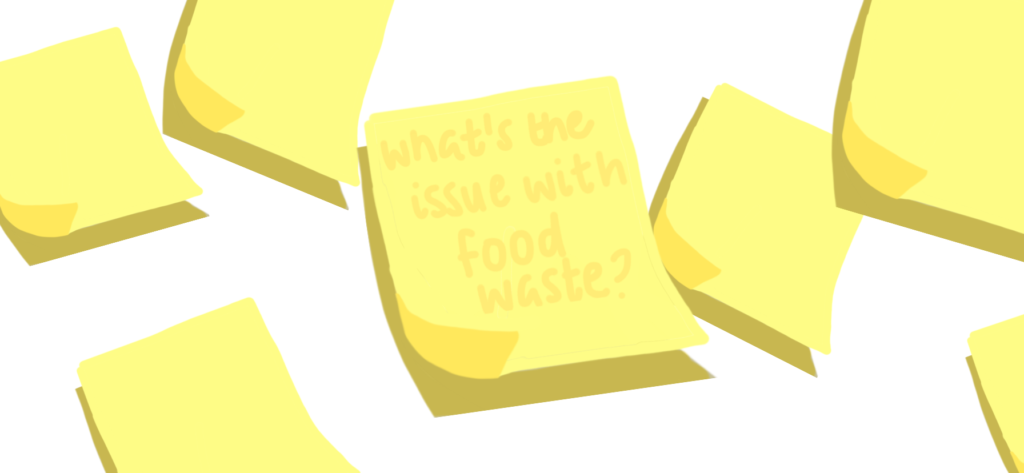You probably won’t be surprised if I say that the amount we’re consuming and throwing away is harming the planet. But if you’re anything like me, the impact of food waste specifically might not have been something you were aware of.
Find out what the problem is, and what steps we can take to tackle it.
Scroll to:
- is food waste a problem?
- how is food being wasted?
- the issue with food waste
- tackling the food-waste crisis
- resources
is food waste a problem?
I’d heard people mention it as an issue, but in my head, I always reasoned that
- food decomposes easily (wrong, scroll to see why)
- when food does break down, nothing “bad” is released. It doesn’t add microplastics to our waterways or leach out dangerous chemicals (wrong again, scroll to see why)
So how much of a problem can it be? Well, as it turns out: a pretty big one.
how is food being wasted?
Let’s start with the size of the issue and who’s causing it.
amount of waste
A shocking one third of food produced globally is lost or wasted (or 1.3 billion tons). A chunk of that is gone before it reaches our fridges, when wonky fruit and veg is discarded or shops decide to stop ordering food that has already been produced, for example.
Reportedly though, around 70% of food is wasted in our homes. That adds up to around £730 annually per household.
what’s causing us to waste food?
This household wastefulness is partly down to sneaky supermarket tactics that convince us to pile up our baskets with items that definitely weren’t on the list.
Shops take steps like
- getting us walk at a slower pace
- running promotions
- drawing in our attention with bright colours
- packaging up higher volumes of food than we actually want
This means we can be convinced to buy items we don’t need, and supermarkets are effectively pushing the waste onto us.

If you’ve ever dropped in to pick up a pint of milk and come out with your arms full (pay for a bag, are you joking?), you’re not alone. But there are still steps we can take to counteract these issues ourselves and lessen our individual waste.
[food waste] releases high levels of deadly methane,
[which is] 25x stronger than carbon dioxide
the issue with food waste
So, what impact is that amount of waste having?
Find out more about how food waste is:
contributing to pollution
When we, or anyone else involved in the chain of getting food from field to fridge, chuck uneaten items in the black bin, that’s probably not as harmless as it may seem. Mostly, this waste will end up in landfill.
slow breakdown
Here’s where we see that my previous point about how easily food breaks down was my first flawed assumption.
Because of the anaerobic conditions (the lack of oxygen) created when rubbish is compressed in landfill sites, food and drink actually take far longer than normal to decompose.
One archaeologist even reported finding perfectly preserved 20-year-old guac buried in landfill, during an excavation.
That means that food waste contributes to the problem of excessive amounts of land used for landfill, and perpetuates the issue for much longer than I would’ve assumed.
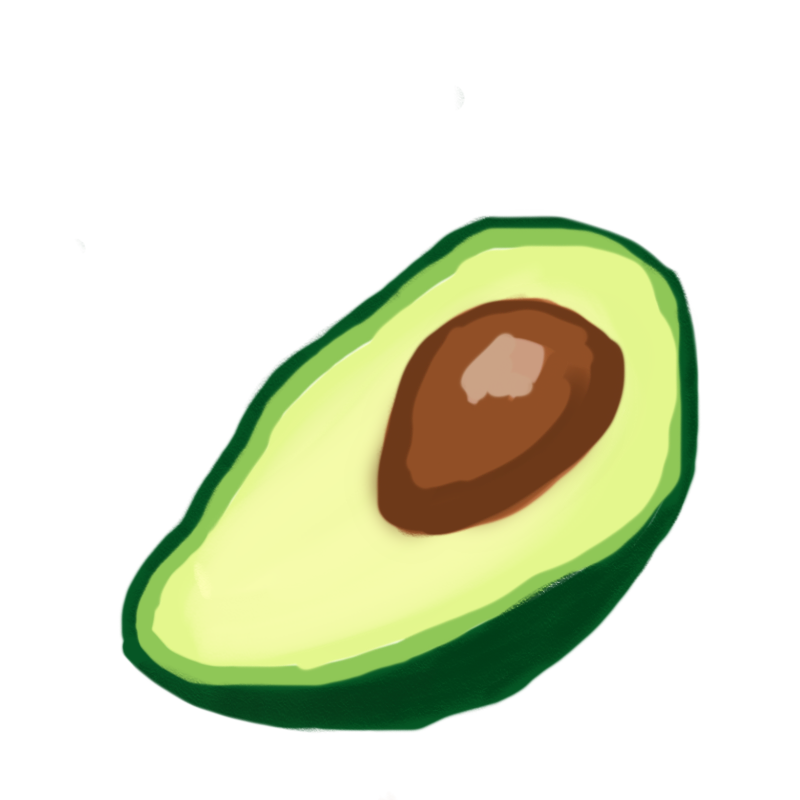
release of toxins
On top of that, when food does break down, there are further issues.
Here’s my second mistake. due to those anaerobic conditions mentioned, when organic matter breaks down, it actually releases high levels of deadly methane. That methane is 25x stronger than carbon dioxide (pretty “bad”).
Food and drink also contain high levels of liquid, and so release this when they decompose. Because of that anaerobic breakdown, the liquid contains toxic substances like ammonia and nitrogen. As it seeps through other rubbish, further contaminants are picked up.
The result is a substance called leachate, which is toxic, and this ends up leaking into our waterways and environment.
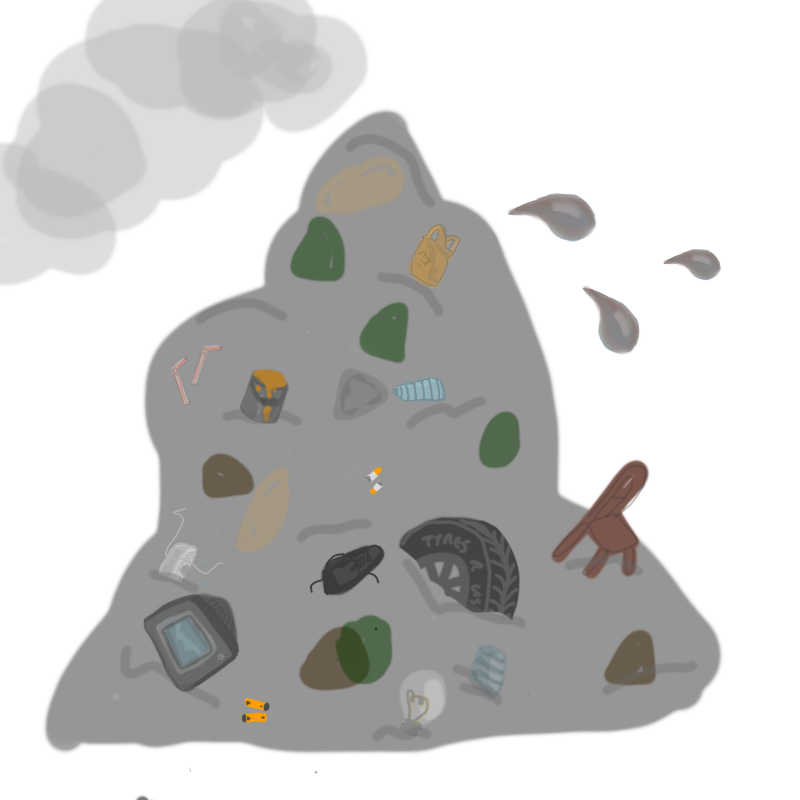
wasting resources
When we send out bananas, bread and beef to landfill, we’re also effectively putting all of the resources that went into growing and producing them to waste. Those resources include
- labour
- energy
- packaging
- transport
- water (25% of the fresh water we consume annually is wasted)
- land (an area larger than China is wasted)
Food production is responsible for nearly a third of our total greenhouse gas emissions, and food waste is estimated to be responsible for 8–10%.

amplifying social disparity
This last point might have been the first to come to mind, if your parents were anything like mine. Did you get the offhand “people are starving” reminder when you turned down all vegetables?
I feel like the repetition actually made me become a little immune to the whole concept, but once I started to do more research, the reality hit home.
While we (consumers and businesses) throw away 15 billion meals, 1 in 9 people in the world are going hungry, and one in three are malnourished – pretty sobering facts.
On top of that, 70% of global freshwater is used for agriculture, and eight of the top 10 countries the UK sources fruit and veg from are drought prone. This means we are using up extremely precious resources ahead of people who are likely already struggling.
While reducing our food waste individually may not seem like it would have a direct impact or help those who are going hungry, the UN has actually found that if we limit food waste worldwide, we could reduce the need to raise more food by 60%.
1 in 9 people… are going hungry
tackling the food-waste crisis
So, what can be done about the issue? Here are a few suggestions that work for me, and what I like best about them.
before shopping
Before you even head out to a supermarket, there are a couple of things that you can do to help reduce food waste.

- Meal plan.
I’d recommend putting together a rough meal plan for the week, and then make a list of what you’ll need to buy based on that. Here are a couple of things to help you on your way:- My meal plan template (complete with a sample week from yours truly), free to download and fill in yourself.
- The Love Food Hate Waste Portion Planner. It’s a great resource that works out exactly how much you’ll need of each ingredient, depending on how many meals you want to make with it, how many people you’re feeding and what age they are.
- Make use of food-waste apps.
Check out Olio, where you can grab food for free from other members of the community, or Too Good To Go, where you can pay a small price for unwanted food from businesses, and see whether there’s anything you need that would otherwise go to waste. It’s unlikely you’ll be able to live solely off other people’s unwanted food, but it’s a win-win for you and the environment if you can tick an item of your list before even leaving for the supermarket.
what I like best
![]() You can save some money by getting free or reduced food, and actually feel kinda good about it.
You can save some money by getting free or reduced food, and actually feel kinda good about it.![]() Meal planning can be a pretty fun, creative activity if you go for the bullet-journal thing, but don’t put pressure on yourself to make anything impressive or too rigid if that’s not what you’re into (feel free to use my template instead!)
Meal planning can be a pretty fun, creative activity if you go for the bullet-journal thing, but don’t put pressure on yourself to make anything impressive or too rigid if that’s not what you’re into (feel free to use my template instead!)
Plus, even if you don’t find the planning itself a relaxing activity, it’s still great for taking the mental load off yourself after a busy day, because you’ll have already done the thinking and buying in advance.![]() Planning is also a great chance to get an overview of odds and ends you have left hanging around in your fridge and cupboards, and you can plan to use them in meals over the next few days.
Planning is also a great chance to get an overview of odds and ends you have left hanging around in your fridge and cupboards, and you can plan to use them in meals over the next few days.
in the shop
So, mask on, list in hand, through the supermarket doors, now what?
Well, now’s the time to make sure you stick to that list, and try your best not to get drawn into those sneaky supermarket tactics mentioned earlier.
Ideally, don’t:
- Buy into a promotion if you only actually wanted one of the items
- Load up on more than you needed, e.g. buying a whole bag of potatoes when you only wanted three, even if it’s slightly more expensive per weight. (Did you know, potatoes are the most wasted food in the UK?)
what I like best
![]() You’ll actually probably save money in the long run by not buying into promotions (if it’s going in your bin, that’s essentially money you’ve lost, so it’s a false economy no matter how low the price tag!)
You’ll actually probably save money in the long run by not buying into promotions (if it’s going in your bin, that’s essentially money you’ve lost, so it’s a false economy no matter how low the price tag!)
at home
Once you get home, there are even more steps you can take to make sure all of that food you’ve just bought won’t go to waste.
First of all, do a bit of prep as you put things away:
- Make a “USE ME FIRST” box or drawer.
Add in anything left over in your fridge or likely to go off more quickly, so it’s easier to remember to reach for it and you don’t risk things going bad because they’re hidden at the back of your fridge. - Swap out packaging to extend the life of fruit and veg.
For example, put anything easily squishable into a hardier container (e.g. berries, salad leaves), stick mushrooms in a paper bag, and wrap a damp paper towel around fresh herbs, then pop them in a glass of water.
Once everything’s put away, keep going with using things up. Try to stick to your meal plan, though I know that’s not always practical in practice. If you do spot that something’s on the turn, try making use of it in some other way.
For example:
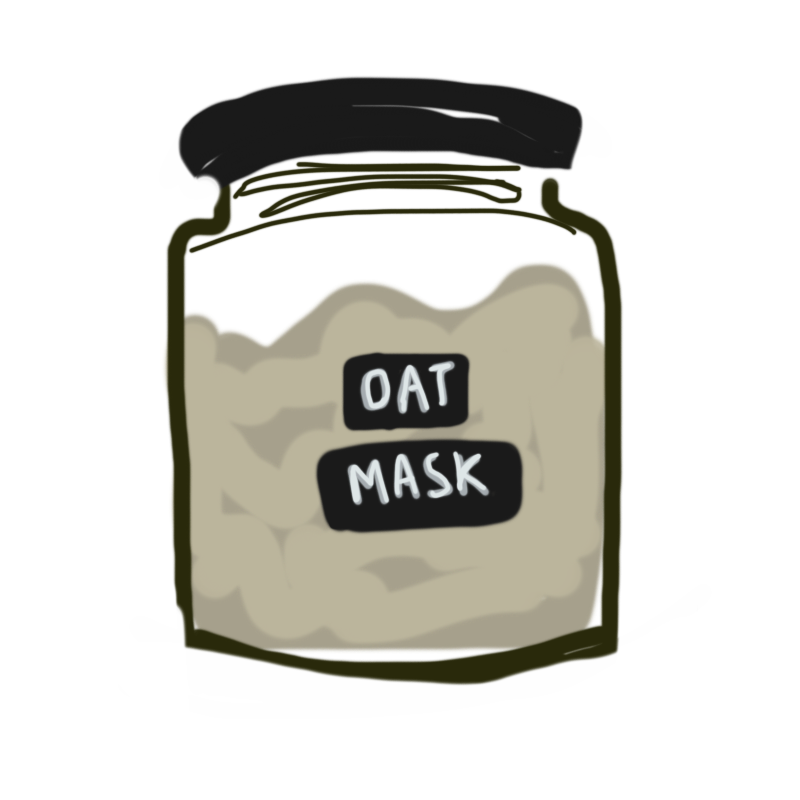
- Repurpose it.
See my post here with ideas for using up old citrus fruit, yoghurt, oats, veggie peelings and apples, or dream up your own uses. - Preserve it.
Make a jam, chutney or pickle the food in vinegar. Check out my chilli jam and sweet chilli sauce recipe for a way to preserve chillies and tomatoes. - Freeze it.
Bread a bit stale? Freeze it, it’ll still make great toast. Potatoes starting to sprout? Slice them, roast them and freeze them, you’ll have homemade oven chips. A ton of veggies going off? Batch-cook a meal and freeze it in portions. Type in any ingredients you have here, and you can find a recipe to use them up. - Donate it.
Look at whether you can give away any food that will go bad before you get to it – try a food bank, Community Fridge or the Olio app.
what I like best
![]() Having everything in order in the fridge helps me to feel less overwhelmed, and it keeps my fridge cleaner (I don’t find myself pulling out three-month-old soggy cucumbers I forgot about).
Having everything in order in the fridge helps me to feel less overwhelmed, and it keeps my fridge cleaner (I don’t find myself pulling out three-month-old soggy cucumbers I forgot about).![]() Trying to use things up makes me more inventive with food, and I can get on a roll with inspiring new ideas.
Trying to use things up makes me more inventive with food, and I can get on a roll with inspiring new ideas.![]() Donating food means you can help out those struggling in your community.
Donating food means you can help out those struggling in your community.
dealing with waste
Despite all the best intentions, you’re probably going to still unearth the odd furry tomato.
Even if we all try our best to use up as much of our food as we can, there will still be things that go to waste. The first thing I want to say is don’t beat yourself up! We all have busy lives, and sometimes things get on top of us.
So, what do we do with those (unintentionally) green tomoatoes, if your council won’t collect food waste?


- Compost: Turn your food waste back into plant food. If you have a sizeable garden, why not try starting up a compost heap, or alternatively, a wormery?
If you’re interested in doing this, there’s a bunch of information on the Recycle Now website. On top of diverting food waste from landfill, over a year, your at-home heap heap could also balance out the CO2 your kettle produces annually.
I realise we’re not all lucky enough to have enough space for a compost heap or reason to use one, so an alternative is to see if a neighbour has one you can add to! Check out who’s accepting compost donations in your local area on ShareWaste. - Recycle: If composting isn’t feasible, the next-best option is to try and recycle your food waste. Find your nearest food-waste recycling centre here.
- Pile on the pressure: If you have neither of those options available to you, your food unfortunately is probably heading for the black bin. But, to help balance that out, another step you can take is to put pressure on the industry to change and reduce food waste overall.
We can do this:- With our wallets – For example, actively choosing wonky veg shows supermarkets we’re willing to buy it, and should stop them rejecting it form suppliers.
Not buying into promotions and shopping for only what we need should force them to stop overpurchasing.
Businesses need to cater to consumer trends to stay in profit, so this type of action should eventually have an impact! - By targeting people in authority – If don’t have a separate food-waste collection in your area, you could start a petition or write to your councillors!
Birmingham Friends of the Earth began a campaign to prevent otherwise treatable waste from going to incineration a few years ago, including calling for the separate collection of food waste. They created a petition, which is still ongoing, and provided a sample letter for individuals in the city to send to their councillors, which could be a great template for any other city.
Find your local councillor and email them from here.
- With our wallets – For example, actively choosing wonky veg shows supermarkets we’re willing to buy it, and should stop them rejecting it form suppliers.
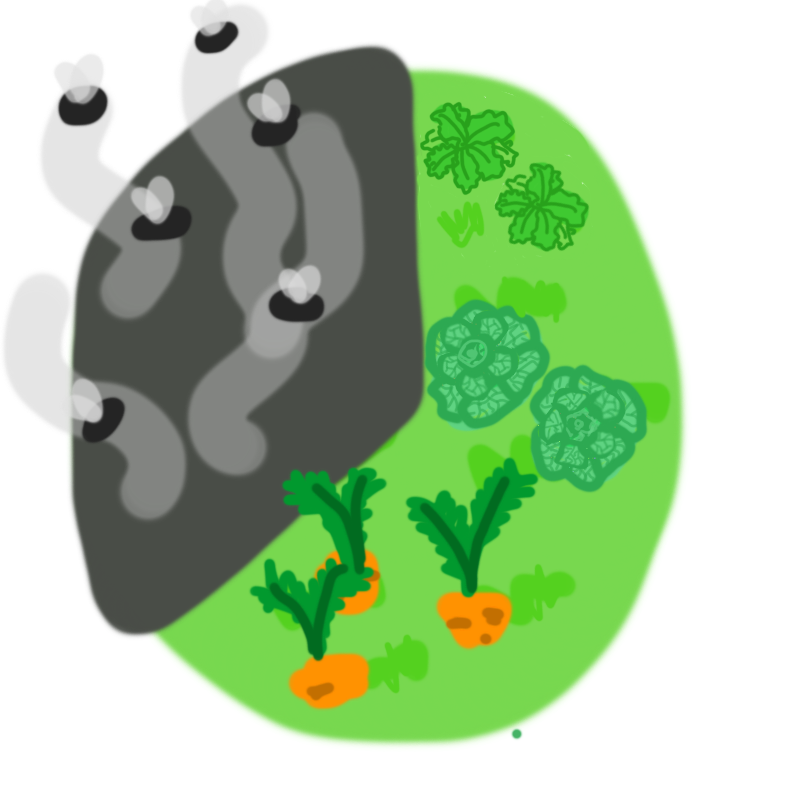
resources
Here are all the useful resources mentioned in the article:
- slow sheffield Meal Planner
- Love Food Hate Waste Portion Planner
- Olio app
- Too Good To Go app
- “easy ways to reuse waste” post
- Chilli jam/sweet chilli recipe
- Love Food Hate Waste recipe finder
- Food Bank – donation points in your area
- Community Fridge – donation points in your area
- Recycle Now information on starting a compost heap
- Recycle Now local refuse options
- ShareWaste – compost heaps near you
- WriteToThem – find your councillor and write to them
- Birmingham FOE sample letter to councillors
